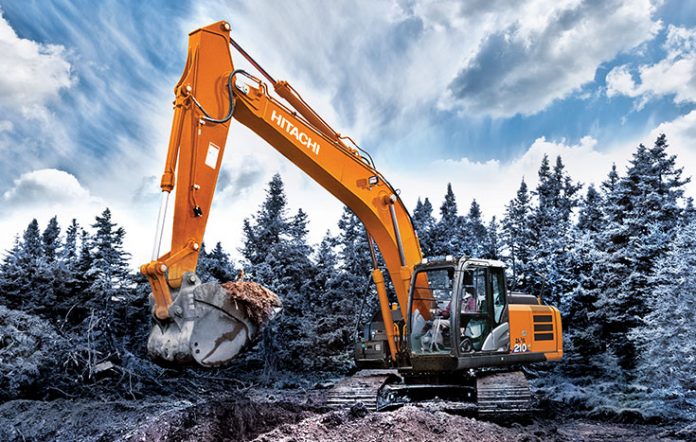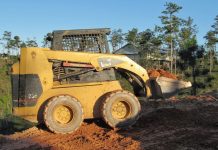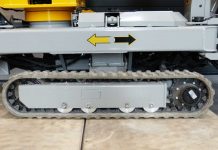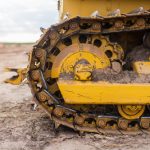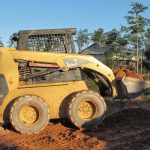After the heat of the summer, we’ve finally entered fall. That means that cold winter weather is not too far away, and it’s never too early to begin thinking about preparing your heavy vehicles for when the cold wind blows. In some regions of the US, the tough winters we encounter can be quite hard on your heavy equipment if you don’t take certain precautions to prevent damage from occurring.
These tips will help you preserve the efficiency of your vehicles when the temperature gets below 30.
Prepare the operators
First of all, make sure that your vehicle operators are dressed correctly for the cold, even if the machine is protected from the elements. Loose clothing should also be avoided as this is creates a real danger of an accident.
Operators need to be confident that they can handle their machine during snowy and icy conditions. This can avoid mistakes such as excessive down pressure, which may harm the operator and others. In order to increase visibility, flashing lights, warning sirens and other technology should be considered. Make sure the defroster is not impairing the vision from the vehicle’s windows and doors.
Visually check your machines
Check your machine owner’s handbook for maintenance tips. These generally include advice on your machine’s oil and fluid and other seasonal machine maintenance duties. A thorough inspection of your machinery will identify any problems that might be exacerbated when the mercury falls. Look closely at your tires, batteries, wiring and hoses and repair or replace any damage components, such as cracks, cuts or worn areas. It also helps if the machine is as clean as possible to identify leaks and other issues.
Engine Maintenance
When it comes to the engine of a machine, three things must be focused on: fuel, lubrication and air filtration. If that is not achieve, it might be expensive to repair the machine.
Maintaining the fuel system consists of cleaning the cap / vent fuel tank and ensuring that the cap is correctly functioning. Be sure to check for water or debris in the gas as this is the number one cause of failure of the fuel injection system. Also don’t forget to check the fuel filter. Make sure that your supplier is providing you with quality fuel. Fuel quality issues, such as fuel moisture and contaminants, tend to be magnified by cold weather.
Motor oils safeguard the essential parts of the engine. It’s a good idea to ensure that the lubricant and changing interval recommendations of the manufacturer are always followed.
Examine the air filtration systems as it could have openings that let in unfiltered air, and use the correct filter when replacing it. Tainted air is a frequent cause of serious engine failure.
Maintain your batteries
Preventive battery maintenance starts in the fall. Many steps are required for operators to begin preparing their devices for the cold winter months. Check firstly that the electrolyte battery is up to the full indicator ring and above the plates. Dry plates will never work well again. The rated current output of the alternator and load test current output should also be checked.
Operators are expected to wash any dirt and debris from the top of the battery; they can produce a conductive trajectory and slowly drain energy. Take a little baking soda and a terminal brush to the posts when you see any corrosion. The most important thing is to ensure clean, secure contact between terminal posts and cables to ensure consistent levels of current from the battery to the machine.
If the machine is going to be parked for most of the winter outdoors, it is best to remove the batteries and put them indoors to avoid freezing. Whenever the battery is sitting for a longer period of time, you should connect it to a battery maintainer to keep fully charged. This will keep them fully charged until it time to use the vehicle again.
Contrary to popular belief, cold temperatures do not substantially affect the battery’s service life. It does, however, cause a ‘stress test’ that amplifies the impact of time, heat, vibration and efficiency of the charging scheme.
If the machine is to be driven throughout the winter season, it is essential to ensure that the batteries are correctly charged. An undercharged battery can perform well at 80 ° F, but its real performance is apparent at 0 ° F when the demands from the machine can boost by 200 percent and the battery, even in good condition, operates at 40% of it’s power during the summertime.
Utilizing the Undercarriage
The undercarriage of a machine embodies approximately 40 to 60 per cent of the costs of maintenance over the service life of the machine. In order to maximize the effectiveness of the machine in the winter, adequate undercarriage servicing is crucial. Operators should carry out regular checks and keep them clean of any mud, snow or debris. Look carefully for loose or worn components, and refer to the operator’s handbook for best-practice track tensioning and adjustment. Whether working or storing the machine during the winter, make sure that undercarriage inspection is scheduled once a year.
Store equipment in enclosed storage facilities
If your machine is not being used, it’s best to keep it inside for easier start-up and less time needed to brush off all the accumulated snow. Be sure to also remove any attachments and store them individually to avoid damage to the hinges and joints.
Store Diesel Exhaust Fluid (DEF) properly
DEF can freeze when exposed to temperatures below 12 degrees. If your machine uses this kind of fluid, know that it can freeze and thaw and still work properly. DEF is good for up to one year but make sure it is stored in a HTPE plastic or stainless steel container, because it can corrode other materials. When storing DEF, make sure you don’t fill it to the brim. It can expand in freezing temperatures up to 7 percent and could crack the container it is in.
Now you know how to protect your investments during the colder months. By taking these steps, you’ll prepare yourself better whenever during the toughest weather conditions of the year.


